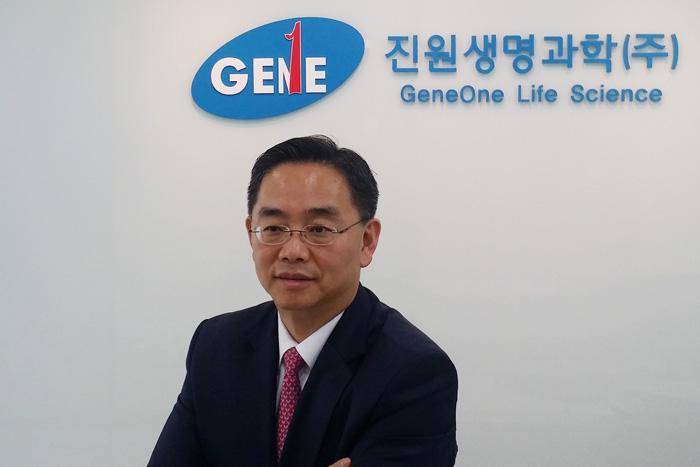Off the Ground

Young Park ’87
Young Park ’87 and GeneOne make medical history with the first human trial of a Zika vaccine
by Tony Moore
The Zika virus was discovered in 1947, but it wasn’t until late 2014 that it landed on the public’s radar. Now, coinciding with the virus’ appearance in the continental U.S. and the Summer Olympics in Rio de Janeiro, where Zika is a major concern, the first human trial for a Zika vaccine is underway.
The company behind this landmark clinical trial is GeneOne Life Science, and Young Park ’87, a former economics major, is the company’s president and CEO.
“I give great credit to Dickinson, and I'm a great fan of the liberal-arts education. It opens up your mind to different areas, teaches you to think. You develop curiosity, and you can explore. It's a great foundation for future work, and maybe because of that, I was a lawyer but was willing to go into biotech and learn biology.”
—Young Park ’87
“Zika is such a difficult virus, and every week we're finding different things about it in our laboratories,” says Park, who was a practicing attorney before making the leap into biotech about 15 years ago. “It does strange and scary things. There will be things that come out about it in the future, and people will be shocked.”
Carried and transmitted by mosquito bites, Zika has been found to cause birth defects, including microcephaly, in babies born to infected mothers. It also can cause significant neurologic disease in adults, including Guillain-Barre, a rare disorder that can occur after some viral and bacterial infections, causing progressive loss of nerve function. Currently, there is no vaccine or treatment for Zika, and the race is on from all corners of the pharmaceutical industry to be the first to find an answer.
“Usually, it takes about 10 to 15 years to develop a vaccine and years to dose the first human,” Park says, noting that the clinical subjects are people who don’t have the Zika virus and aren’t otherwise sick. “We're doing it all in months.”
One way GeneOne—and its collaborator on the Zika trial, Inovio, a company Park previously worked for—is able to get the trials off the ground so quickly is that because of the advanced technology involved in their drug platform, the FDA doesn’t require any toxicology tests for the vaccine.
“We're taking a novel approach to clinical trials,” Park says. “We don't use an actual virus, live or dead; we use a computer-generated DNA sequence of the virus that cannot actually cause infection in humans. Therefore, it’s safe. When your body detects our DNA vaccine, it sees the DNA sequence of the virus—not all of it, a certain part of it. And the body will generate an immune response against it.”
The vaccine, at this stage referred to as GLS-5700, became the first Zika vaccine to be injected into a human subject on July 26, after going through mice and nonhuman primate trials previously. If it’s successful, and if the results come in before those of other researchers, it will be the first synthetic DNA vaccine ever to make it to market—25 years after the technology was first explored.
Park says GeneOne is at least months ahead of the closest competition, and interim results will be in by year’s end. The speed of the development process via the DNA sequencing platform is key to being able to quickly tackle any widespread health crisis.
“Let’s say there is another pandemic situation, and people are dying,” Park says. “How do you respond? We are constantly working on speeding up the process, and a DNA vaccine may be one of very few technologies that allow us to respond very quickly: We're looking at seven months from the concept to human trials.”
GeneOne is also using its DNA sequencing platform to develop vaccines for MERS (Middle East respiratory syndrome), currently in trials at Walter Reed Army Institute of Research, and for Ebola, data for which will be released next spring.
Learn more
- Alumni in Action
- Department of Economics
- "A Conversation With David Satcher: From the Liberal Arts to Zika"
- Latest News
Published August 4, 2016